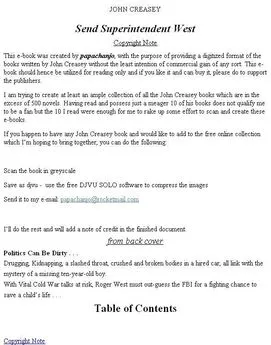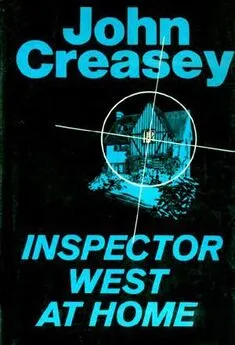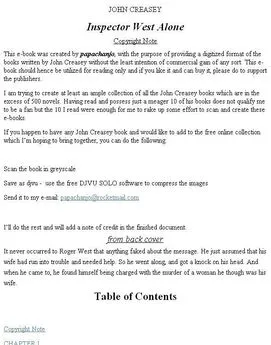John Creasey - Send Superintendent West
- Название:Send Superintendent West
- Автор:
- Жанр:
- Издательство:неизвестно
- Год:неизвестен
- ISBN:нет данных
- Рейтинг:
- Избранное:Добавить в избранное
-
Отзывы:
-
Ваша оценка:
John Creasey - Send Superintendent West краткое содержание
Send Superintendent West - читать онлайн бесплатно полную версию (весь текст целиком)
Интервал:
Закладка:
“How much do you know about the Shawns?” Roger asked.
Pullinger shrugged.
“I’m David’s cloak and dagger when he’s on this side. I was around when he was shot at in his Connecticut house. If you believe him, I pushed him away from an auto that was going to run him down. You might say that Shawn built up my reputation for me!” Pullinger offered cigarettes from a golden coloured packet.
“Thanks.” Roger took one.
Pullinger went to the door. “I’ll call you when I’m back, but it won’t be for an hour. See you.”
He went out, and Roger drew on the cigarette and then went to the window and looked down on to the sea of dancing light, heard the din of traffic, even the footsteps of the crowds on the pavement He laughed at himself, opened one case, took out a clean shirt, his shaving-gear, everything he would need. When he was in the middle of shaving in a bathroom which had everything, including a tap marked “Iced Water” — and it was ice cold — he yawned.
He hadn’t slept much on the journey or the night before. He might have been wiser to have a walk round the streets by himself and come back to his room early. He couldn’t disappoint Pullinger now — “Ed’ wanted to show off a New York he obviously loved. And why not? Roger yawned again. He finished shaving. He had half an hour to spare, and ten minutes in a comfortable-looking armchair wouldn’t do any harm. It would be pleasant to close his eyes.
He went to sleep.
He was still asleep, nearly an hour later, when the door opened and two men came in. One was stocky, with broad shoulders and a swinging walk. He had a wide-brimmed hat, and was smoking a cigar. He didn’t smile. The other did smile; stepping across to Roger, he looked down, and said lightly:
“He’ll have a shock when he comes round.”
“Who said he was coming round?”
“I did. We have to get him away, we don’t have to leave a body. You’re going to help me dress him. Then we’ll take him down between us. Just another drunk. Gene will have the car outside, all ready for him.”
“Where are you going to take him?”
“Someone forgot to tell you not to ask questions.”
“Who is the guy?” the stocky man said, but didn’t expect an answer. He looked at a BOAC label on a suitcase. “British, eh? You can tell he’s a foreigner.” He went round to the back of Roger’s chair, and Roger didn’t stir. “Jesse! Take a look at the back of his head.”
“I heard about that,” said the other. “Take a look at his coat and get him into it.”
That didn’t take long.
They poured whisky into a glass, splashed a little into Roger’s face, over his coat and shirt, then rumpled his hair, pulled his tie to one side, unfastened his collar. Then the man with the big shoulders pulled Roger to his feet, put one of Roger’s arms round his neck, and dragged him towards the door. They got him to the elevator, his feet scuffing the carpet. The elevator man didn’t blink an eye.
No one in the hall took much notice. A woman stared disgustedly, and turned her back. A car drew up at the kerb as they appeared outside the hotel, which was poorly lit compared with most of the shops and buildings. It was a big Dodge, black, several years old. They bundled Roger into it. His head lolled back, he sat slumped into the corner, with one man by his side. The broad-shouldered man didn’t get in. The driver, who didn’t speak, slid into the stream of traffic. They turned right and right again, then drove straight out to the Hudson River Parkway, got on to the parkway at 57th Street, then drove fast towards the toll stations and on towards the Merritt Parkway and Connecticut.
Roger still slept.
The lights of New York lit up the sky behind him.
15
LIGHT
ROGER had a sense of having slept for several hours; a sense of vanished time; a void he couldn’t fill but which he knew had been peopled with men and swift movement. It was dark, but this time he had no pain, only a numbness in his head and limbs and heaviness at the back of his eyes. He felt no sense of alarm, and he was quite comfortable. He began to try to remember, and at first it seemed that there was something in the past which was all-important, but he couldn’t recall what it was. Then pictures flashed on to the retina of his mind — Marino and all that had followed, a thin-faced child, Lissa, the airport, Janet, the boys, the flight, New York and a smiling, loose-limbed youngster who seemed to be one of a pattern stamped out and freely used at Grosvenor Square. With all this, a feeling persisted that some vital factor had been presented to him, but he couldn’t place it.
Ed Pullinger, a promise of dinner in Greenwich Village, a wash and shave and the easy chair.
He wasn’t sitting, now, he was lying at full length, and he knew that he hadn’t just come round after forty winks.
The numbness discouraged him from trying to move, but he threw that off and sat up. It was no effort and brought no pain. His feet touched the floor, and the couch or bed gave beneath him. He stood up. The darkness remained, thick and impenetrable, but it didn’t blanket sound. He heard a man’s footsteps, sat down again, dropped back and lay in the position he had been in when he had come round. The footsteps drew nearer, heavy and deliberate; he heard another sound, which might have been the jingling of keys. Tension gripped him. The man stopped, there was a moment’s pause — and then a shaft of light streamed into the room.
It missed his eyes, yet still dazzled him. It came from a square hole on the other side of the room, not far away. Then a shadow darkened the light, and he made out the shape of a man’s head; another light came on, inside the room, bright enough but not dazzling. The shadow faded and the other light went out, as if it had been cut off, then the room light was doused. The footsteps receded, until only the brooding silence kept him company.
He had been hypnotized by the light from the square hole, had stared that way, without looking about him, but now the picture of the room formed slowly in his mind. He was in a corner, with his head near a wall. There were two armchairs, an upright chair and a small table — he could place them within inches. In the far corner was a hand-basin; he even remembered a glass standing on the shield above the basin.
He stood up cautiously and moved about, testing his mind-pictures and finding them correct. The room was no more than ten feet square, there was nothing on the walls, nothing he had noticed. He reached the door, and felt it with the palms of his hands, until he touched the edge of the square window through which the first light had come. He traced the outline of this window with his fingers, then spanned the side of the square between his thumb and little finger. It was about fifteen inches, base and side. He drew back, forcing all his thoughts on to it. There was a hole cut in the door; on the other side a panel had been removed or swung bade, admitting light from the room or passage beyond. That light was probably still on.
He turned away.
The room was uncomfortably warm, and he hadn’t realized that before — he had generated his own heat out of the tension. He felt dry, and groped his way to the hand-basin, feeling cautiously for the glass, then for a tap. He didn’t know whether it was hot or cold. He ran it for a few seconds, and it kept cold, so he pushed the glass under it Water spilled over his hand and splashed on to his coat. He had a drink, but not too much, waited, then drank again. That was much better. He turned back, heading for one of the easy chairs, his hands stretched out because he hadn’t all his bearings yet. He touched it — and a light split the darkness, swift and blinding, then went out
He snatched his hand away from the chair.
The darkness seemed worse now.
Had the light come on when he had touched the chair — or had it been coincidence? He tried again. Nothing happened. He sat down and tried to relax, but that blinding light had left him more uneasy and disturbed. He waited for it to come again, but nothing happened. For a few minutes he couldn’t bring himself to think clearly, but gradually the effect of the light faded.
What had happened after he had sat down for a nap?
He hardly needed to think. He had been drugged and brought away from the hotel, but he needed to exercise logic as a child repeated the ABC. He had been drugged. Someone had drugged him. Who?
Ed Pullinger?
He had smoked one of Pullinger’s cigarettes; and they had both had a drink sent up to them. His a whisky and soda, Pullinger’s a Bourbon on the rocks. Roger had watched the Bourbon pour out of the little glass and cascade down the three small lumps of ice in the long glass, just like Marino’s way of drinking. The dope might have been in the cigarette, then, or it might have been in the drink. Pullinger might have been doped, too.
He must keep a clear mind.
He laughed, and that didn’t do him any good. How would a clear mind help him? Where was he? Who —
Light flashed!
It seemed to scorch his eyes with white heat, was as blinding as the darkness, he sat with his hands clenched, every nerve taut. A swift succession of flashes, each as vicious as the last, went on and off, as if it would never stop; but it did stop.
He didn’t relax. Sweat fell slowly down his forehead to his cheeks. He was wet with sweat; lips, neck, cheeks and the darkness gave him no rest It was a long time before he settled back in his chair, and began to turn his head. He wasn’t sure where the light had come from — in front, above or behind him. It wasn’t here now, but it seemed to be, his eyes were alternately blinded with the glare and with blackness. Gradually, blackness won.
This was deliberate, of course, part of the process of breaking him down, but he didn’t know why he was being broken down. He felt in his pockets again, as if cigarettes and matches might have come back miraculously, but each pocket was empty. He stood up and began to move about, his clothes sticking to him. The darkness remained, so black that it was no hard to believe that anything could break it. Slowly, his nerves settled down, not to normal, but at least free from hurtful tension. He touched each chair, the table, the bed and the hand-basin, had another drink of water, and was putting the glass down when the searing light flashed again.
He dropped the glass, and heard it smash.
He gripped the side of the hand-basin so tightly that his fingers hurt.
The light went on, off, on, off, striking viciously each time, but after the first few seconds he felt steadier, was able to think consciously of fighting against the breaking-down process. This was only light, it offered no danger, was no threat in itself. It would stop in a few minutes, and darkness would come again, giving him rest. He waited for the flashing to stop, much longer than before. It stopped at last, but not in the same way. The light stayed on, so dazzling that he couldn’t see beyond his feet and his hand when he stretched his arm full length. He sat waiting for it to go out, but it didn’t. The only sound was a drumming in his ears, but he began to imagine others, without knowing what they were — only knowing that he had cause to fear them. Was it imagination? He strained his ears but kept his eyes tightly closed, as if that could keep out some of the light
Then he felt himself grabbed on either side. Hands gripped his arms and hauled him to his feet. He was thrust forward. He thought that he was going towards the door, but wasn’t sure, the light had blinded him. He turned right and left, as they pushed him. Their grip hurt, but that wasn’t important, only the blindness mattered; it was as if his eyes had suffered some permanent injury. His feet wouldn’t go where he wanted them to, he stumbled, would have fallen but for the grip of the invisible men. They dragged instead of pushed him, the toes of his shoes scraped along a hard surface. He could hear the sound — and could also hear the footsteps of the men. Neither of them spoke.
Читать дальшеИнтервал:
Закладка:










